Michelle Obama on the First Family’s Hollywood Pivot: “You’ve Got to Meet People Where They Are”
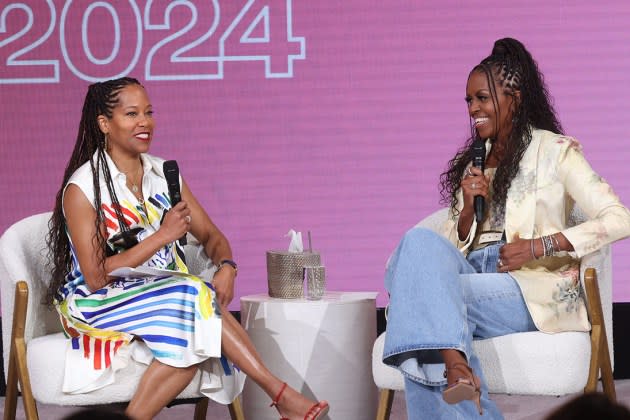
The attendees of CAA Amplify are accustomed to an annual lineup comprising their own high-wattage, high-impact peers, but one of this year’s speakers was truly peerless.
Michelle Obama took the stage at the Ojai Valley Inn on Tuesday with Regina King for a conversation in which the former first lady reflected on her life since the White House and what she and president Barack Obama are looking to do with their production company, Higher Ground.
More from The Hollywood Reporter
'Shogun' Leads Gold List for Asian Pacific Television Honorees
Sage Steele Sues CAA Over Alleged Conflict of Interest in Free Speech Standoff With ESPN
“What’s the format that people come together and learn? It’s movies, it’s short films, it’s stories,” said Obama, whose banner’s releases in the past year included the Jon Batiste documentary American Symphony, biopic Rustin and mystery thriller Leave the World Behind. “This is where America is, and you’ve got to meet people where they are. If Hollywood is where they are, as Barack and I think, then how can we be a part of changing this, helping to be a part of this landscape and broadening the types of stories that get told?”
King noted that Higher Ground’s slate has diversified from the type of serious docs (American Factory, Crip Camp) it launched with, which Obama said was more emblematic of her husband’s tastes. Her own are more light-hearted and populist (if you can think of an unscripted series, she has probably seen it).
With daughter Malia in the audience (and other daughter Sasha, who was celebrating her 23rd birthday, elsewhere on the premises), Obama projected candor in the mostly off-the-record discussion that made it clear her time in the White House was only a fraction of the events that have shaped her identity (and one that she is not looking to return to).
The former first lady was a fitting program anchor in a year in which political movements — and the role of the arts and media within its currents — has felt more urgent than ever. “Welcome to the impossible moment we find ourselves in,” CAA motion picture agent Maha Dakhil said in her remarks to open the day. “I welcome you, acknowledging that we are in crisis. I welcome you, admitting that this year, it’s hard to find the right words to speak up. It’s hard to find courage, when courage is widely discouraged. I welcome you, acknowledging there’s no such thing as safe spaces, only brave places where we must all meet, challenge ourselves and challenge one another.
“Here we are Black, brown, Asian, Indigenous, queer, trans, Muslim, Jewish, Christian, all faiths, no faith,” Dakhil continued, sounding a call to unity amid difference. “We are all carrying our own individual pain, but when we call people in to our experience as opposed to calling them out, when we proactively seek each other out to understand their story, we are reminded that your fight will always be my fight…. Today you will hear stories that will inspire your soul and reignite your courage to lead with your head up when you might be tempted to keep your head down just to get by. Democracy was not won by quiet self-preservation. Like all improbable things, democracy is only preserved by intention, action, community and hope, and I promise you will find all these things in this room.”
Read more about what was found in the room below.
“What’s At Stake: Democracy 2024” — ACLU executive director Anthony Romero and National Women’s Law Center president and CEO Fatima Goss Graves, in conversation with Christy Haubegger
“I can’t cede my beliefs to the right’s vision of the world,” Goss Graves said in response to whether her faith in the justice system and rule of law had faltered in light of revelations of ethical lapses among Supreme Court justices and a former president.
The two progressive lawyers and their respective organizations have collectively filed numerous lawsuits over the years against such policies as Muslim immigration restrictions, book bans and curbs on reproductive rights. “Litigation can help you protect rights in real time,” said Romero, adding that even in the minority of cases they lose, there are still gains. “Every day we keep a clinic open where a woman accesses reproductive health services is a day for justice. We’re going to drag our feet and throw as much sand into the machine as we can.”
Haubegger — whom Dakhil earlier introduced as “Amplify’s fairy godmother” for her role in creating the summit when she was a CAA executive — asked her panel of experts if they anticipated that the Dobbs decision (which the Supreme Court announced while the 2022 Amplify summit was in session two years ago) reversing Roe v. Wade would lead to the Right to Contraception Act failing in the Senate now. “For sure. They’ve always been clear their agenda is going back to both a very narrow idea of controlling the role women have in society. It’s a narrow idea of motherhood at home, not a lot of women in public life, but they haven’t been able to say that out loud,” said Graves. “Dobbs unleashed something special in folks. They captured something in the courts, so they began testing: Why do you need all forms of contraception? IVF?”
Romero noted that the crackdown on reproductive rights could have a silver lining, however. “They gave the most potent tool in this election,” he said, noting that this issue could motivate younger voters and affect upticket races and ballot referendums in multiple states in a climate in which they have otherwise been disillusioned by the administration’s stance on the war in Gaza and on immigration. “Otherwise, it would be hard to animate the number of people we need to animate in this election.”
Although to this reporter, it sounded like Graves and Romero were anticipating a second Trump term, Haubegger asked them to provide an action item for the assembled media luminaries, noting that “hope is a to-do list item.”
“My job is to put in place rules and policies and laws to allow people to actualize our full humanity,” said Romero, noting that his litigation over unjust policies comes alive with storytelling — in other words, narrative examples of their impact on people. “If Trump gets elected, we will do our battles, we’ve got the battles. But you’ve got to give people hope and show stories of their roots, their resilience. You are keepers of the human spirit. I look to you all to keep those flames alive.”
“Impacts of Mis/Disinformation on Our Communities” – The 19th editor-at-large Errin Haynes, Center for Countering Digital Hate founder and CEO Imran Ahmed and CNN anchor and chief legal analyst Laura Coates, in conversation with CAA literary agent Cindy Uh
The fact that carrots ain’t shit might just be the big takeaway from this year’s Amplify. The disdainful declaration was the punchline to a compelling illustration from Ahmed about the long-ranging consequences of disinformation. The idea that carrots helped with eyesight was actually World War 2 propaganda distributed in the media to conceal from the Germans the truth that Britain had developed radar technology to shoot down their planes. “Eighty years later, it had systemic consequences because British farmers started unplowing potatoes and planting carrots,” Ahmed said. “Potatoes are incredibly dense in calories. Carrots are little orange bags of water!”
The panel underscored that mal-information has disproportionately impacted historically oppressed communities, from how carcinogenic baby powder was marketed to Black mothers to vaccine hesitancy amid the COVID-19 pandemic. “The reason that misinformation can be effective against communities of color is because traditional mainstream media has not always shown up in those communities with accurate information and good intentions,” said Haynes. Added Coates, “You cannot look at conspiracy theories or misinformation without looking at the underlying bigotry that governs who is supposed to receive those lies.”
Ahmed said that we are currently in a “nuclear age” of disinformation, where the ease of spreading it (via social media, amplified by algorithms) is now being met by similar ease of creating it, thanks to AI. “Production and distribution, zero marginal cost,” he said, pleading with platforms to come to a negotiated agreement about content standards. “Our society’s not going to survive the age of disinformation.”
Meanwhile, Haynes and Coates said that given the unreliability of platform owners to monitor their content for veracity, the onus falls onto each individual. “There is no cavalry coming. It’s you,” said Coates.
“It’s time to stop blocking the conspiracy theory-wielding people in our lives on Facebook,” added Haynes. “Challenge them when they’re talking about stories that they found on the Internet. There are steps we can take with people in our lives who are not media literate, like identifying and checking multiple sources, and supporting trusted sources of news. The antidote to the Big Lie is as much Big Truth as we can get.”
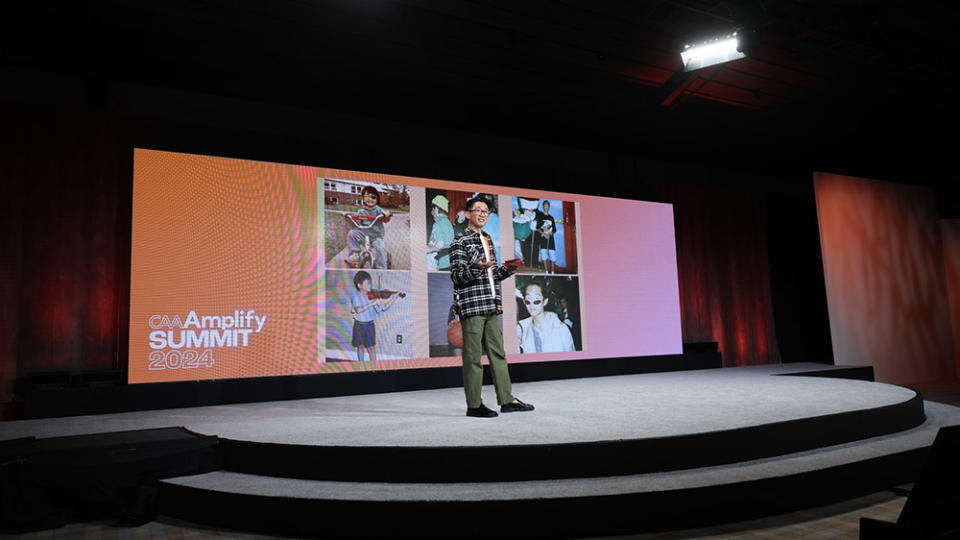
“The Story of a Code Switcher” – Lee Sung Jin
True to the spirit of his much-decorated series Beef, the writer delivered a wry, dark, raw and utterly compelling account of his life, which included multiple childhood moves back and forth from Korea and throughout the United States, and the ensuing assumptions of multiple identities in an attempt to fit in. “Ivy League school in a dormful of Koreans, I’ll join the Korean church. Move to L.A., be like every other local resident and write a screenplay/DJ,” he said. “The pattern was to look around, mimic and repeat. I’d go on generals and execs would ask, ‘What’s your favorite comedy of all time?’ Caddyshack, because I heard so many white dudes from UCB say that. In hindsight, I question whether any of my 20s was genuine. Did I really love Wilco?”
Lee said that all of that assimilation took a psychological toll, sharing that he attempted to take his life about a decade ago: “Do not recommend. Rock bottom, I was forced to look at myself, and I had forgotten who I was. It had been so long since I was me.”
The Emmy winner credited therapy, his wife and psychedelics for helping him to find his true self, without the mimicry. “Beef is the most me I’ve ever been – all the faults, the roots of their psychology,” he said, citing the Carl Jung quote that serves as his acclaimed series’ epigraph: “One does not become enlightened by imagining figures of light, but by making the darkness conscious.”
“If I’m being real with you, I picked it because it sounded real smart, but I didn’t fully grasp it until the show came out,” he told the crowd. “I realized that while life will always be a hellscape, boy can it be fun traversing it with the right people. I cannot wait for all of us to get to know the real you.”
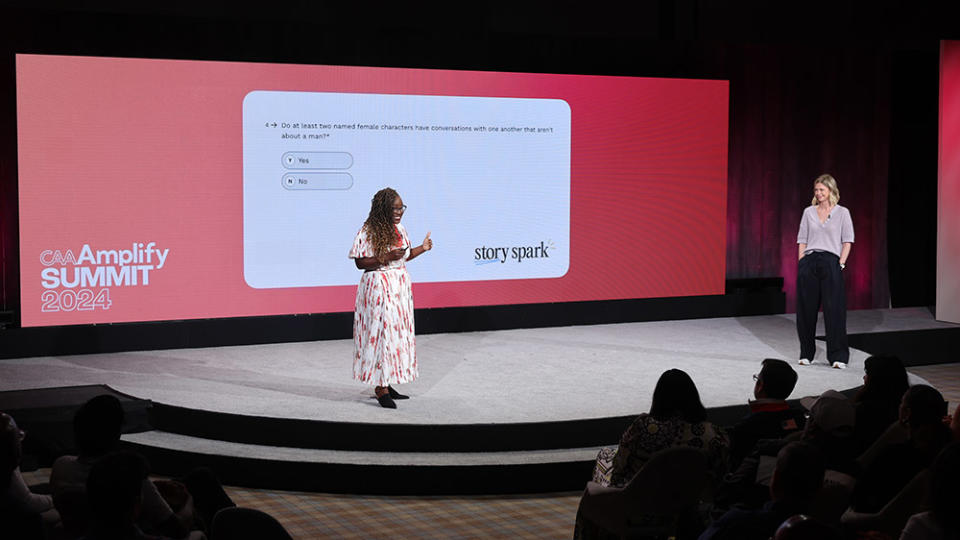
“Story Spark” – Lionsgate Motion Picture Group president of production Erin Westerman and LMPG head of inclusive content Kamala Avila-Salmon
The two executives from the Lionsgate Motion Picture Group unveiled a new online tool that they hope creatives industry-wide can use to check on the inclusivity of their projects.
Story Spark is “like a Buzzfeed quiz,” said Avila-Salmon, one that asks simple, multiple-choice questions that will help creatives check on characters’ intersectionality, diversity and whether they play into any stereotypes or tropes. It’s not a checklist, because – like a Buzzfeed quiz – the tool will use the responses to generate customized recommendations to improve the inclusivity of the project based on whatever stage of development it’s in.
“There aren’t bad scores but only ‘opportunities,’ which is a world we all landed on so that everyone feels safe,” said Westerman of Story Spark, which the studio took several years to develop and refine. “At Lionsgate, we were having the safest conversations, and as a result, the most creative conversations.”
Avila-Salmon emphasized that Story Spark is simply a tool for creatives, who remain in the driver’s seat. “It’s not a magic want. We didn’t solve DEI at Lionsgate; I would have told you if we did,” she said. “It’s not AI and also not a greenlight tool. The stories we use Story Spark on are stories we already decided we’re interested in. We are asking ourselves these questions organically, to open our minds further.”
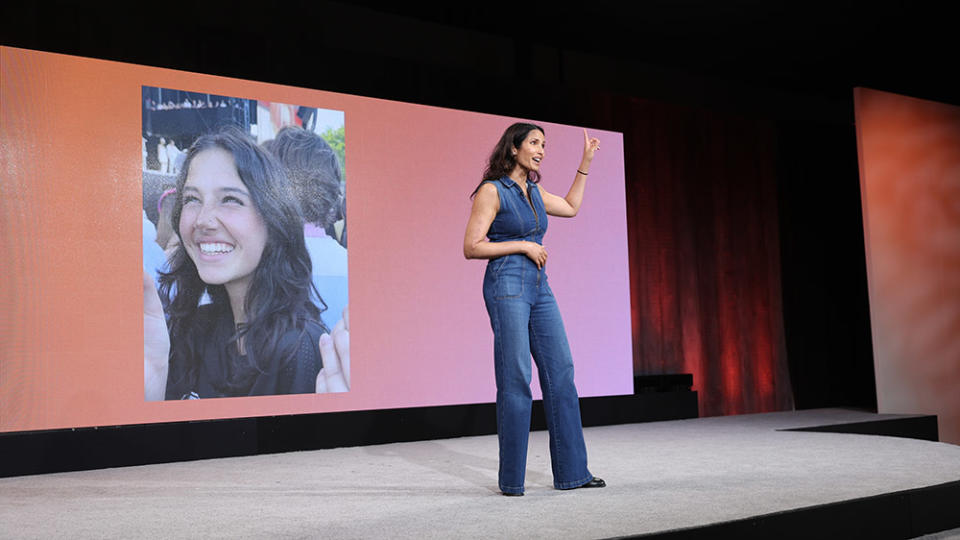
“What It Means to Be the Sandwich Generation” – Padma Lakshmi
The former Top Chef host presented a very funny, slightly profane version of her poised persona in telling a story about keeping the peace between her Indian mother and her biracial daughter, who is “100 percent American teenager.”
“The only time they saw eye to eye was about a nose ring,” Lakshmi said, noting that she herself had always resisted her mother’s wishes to pierce her nose in her desire not to stand out among her peers in the States. But although her daughter may have wanted the piercing more for goth aesthetic than cultural reasons, she teamed up with her grandma in making savvy appeal: “Don’t deny me my culture!”
“You don’t want to deny your culture? Make a fucking cup of chai for your grandma!” said the television personality, who nonetheless relented and took her daughter to get her nose pierced a week before her bat mitzvah. “I wanted everyone in that synagogue to know she’s half Jewish, but she’s half Indian too.”
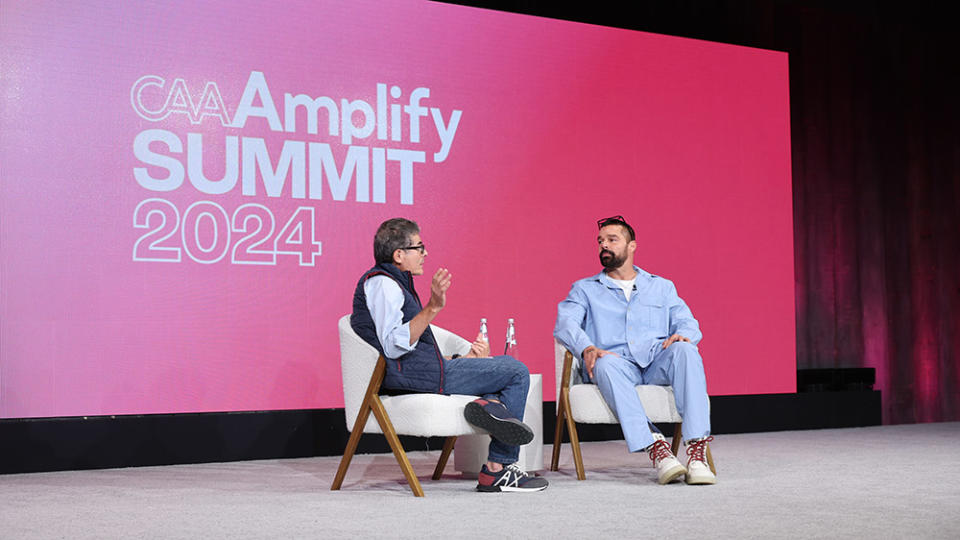
Ricky Martin, in conversation with CAA head of global Latin music touring group Bruno Del Granado
Martin confessed that he had originally planned on retiring after performing at the 1999 Grammys, a clip of which his longtime agent Del Granado played at the top of their conversation. “I had been working since I was 12, so it had been 20 years almost,” said the former Menudo member. “But I guess life had a big surprise for me.” That legendary performance, of course, has been credited with igniting the Latin explosion of the late 1990s, alongside other artists including Shakira, Enrique Iglesias and Marc Anthony.
Martin also credited his Menudo foundation as giving him the discipline to weather becoming a leading man on Broadway, where he starred in Evita for nearly a year, eight shows a week. “When I was 12, I’d wake up at 6 a.m., go to school for three hours, and then crazy rehearsals, concerts and interviews,” he said. “Nowadays that’s called child exploitation. I won’t allow my kids to go through that.”
The pop legend and actor has clear affection for his four children, whose different personalities and passions he lovingly enumerated in the conversation. Exuding sanguinity, he told Del Granado that his public coming out in 2010 was largely a positive experience, and one that was encouraged by his father: “He’s a psychologist and said, ‘Come on, you have two kids. You’re gonna teach them to lie?”
Even the haters, he handled with humor: “One lady came to me and said, ‘The way you have your kids is not very Christian.’ Well, ma’am, do you know the story of Christianity? Maria is a surrogate mother!”
Martin closed his session by advocating his fellow LGBTQ artists to the industry figures in the room. “A couple years ago when I was promoting [The Assassination of Gianni] Versace, this journalist from Poland asked me, ‘Are you afraid you’re going to be typcast as a gay man?’ Do you ask the same thing to Brad Pitt about being a straight man? There are incredible men and women out there in the LGBT community dying to tell stories. Give them the opportunity. They will rock that script, I promise.”
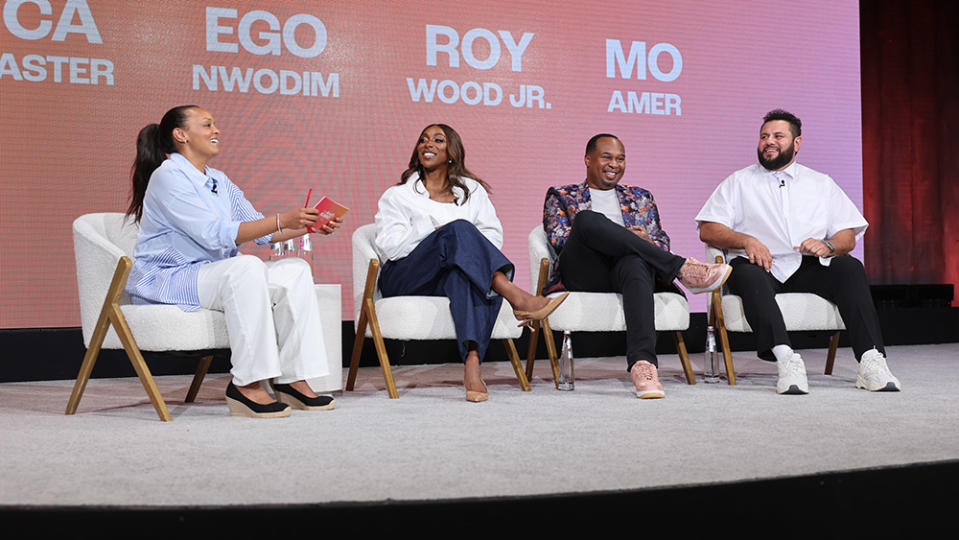
“Comedy Moment” – Ego Nwodim, Roy Wood Jr. and Mo Amer, in conversation with CAA TV agent Erica Lancaster
Three years ago, Nwodim appeared in a Saturday Night Live sketch about vaccine hesitancy among Black people. “The next day, everybody was upset about it. [Black] people said, this conversation should happen amongst ourselves,” said the SNL cast member in response to Alexander’s question about what working in a predominantly white space. “The sketch was written by two brilliant Black writers on the show. Here’s what’s frustrating: Our counterparts are never thinking, ‘Is this going to make my people look bad?’ We have to be up against an institution not made for us, that’s just the truth of it. We’ve edged our way in there. I want us to be able to write from our perspective the same way my white castmates can write about their redneck relatives…. They’re not all rednecks.”
Added Wood, “The issue with The Daily Show is you’re trying to accomplish two goals with the same story: inform white people with the truth, and confirm it for Black people. At The Daily Show, if it’s a Black story, it’s about how angry do I want to make you?”
Wood recalled a pitch he made during the advent of legislation around police body cameras about eight or nine years ago that was a parody of Girls Gone Wild, using the format’s frenetic cuts and leering voiceovers to show jump cuts of police brutality that has been recorded on bodycams. “It did not get approved. That was one of the early lessons [on where the line is],” he said. “Black people can laugh at pain quicker than people seeing it for the first time.”
All three comedians on the panel espoused dedication to the joke as an artform, first and foremost, but did allow that the genre provides opportunity for fostering understanding. Wood’s second-ever Daily Show piece covered the Million Man March, whose motto that year was “Justice or Else.”
“The basic premise was I would talk to Black and white people about what they think ‘or else’ means,” he said. “Black people said, ‘We will continue to march, of course,’ and then we went over to the white side of D.C. and it was like murder, death, every fearful thing. You put that on a show with predominantly white viewership like The Daily Show to say, ‘Hey white people, calm down.’”
“I never wanted to be in a space where I couldn’t be myself,” said Amer. “As someone who’s Palestinian, can I just use my art form as a place of human compassion and understanding? Most of the time, when you sift through all the yelling, you realize that people want the same thing and just don’t know how to articulate it.”
The Amplify lineup also included Human Rights Campaign president Kelley Robinson, marine biologist Ayana Elizabeth Johnson, Oscar-winning filmmaker Sharmeen Obaid-Chinoy, Tik-Tok influencer Reesa Teesa, Paralympian Chuck Aoki and Frito-Lay NA marketing senior director Kimberly Scott, as well as an off-the-record conversation between UC Berkeley professor Omar Wasow and USC student journalist Zain Khan on covering campus protests.
Attendees included Richard Lovett and Kevin Huvane, George Cheeks (in Ojai on the morning Shari Redstone quashed the Skydance/Redbird deal), Gina Prince-Bythewood, Colin Kaepernick, Storm Reid, Tarana Burke, Min Jin Lee, Ashley Park, Nicole Brown, Jay Hernandez, River Gallo and Jillian Mercado.
Best of The Hollywood Reporter

 Yahoo News
Yahoo News 
